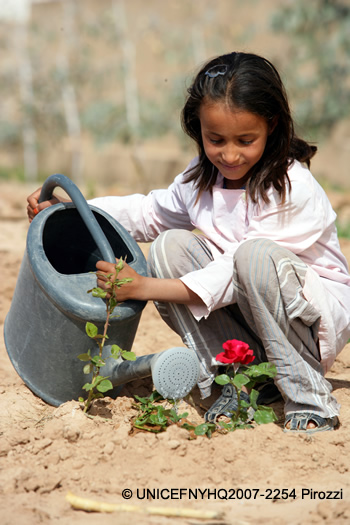Zagora, the largest province of the Souss Massa Drâa region, Morocco
In collaboration with

April 2014 – December 2016
We contribute to creating a safe environment in 19 primary schools and raise community awareness about proper management.
Objectives
- Improve water, sanitation and hygiene facilities
- Raise awareness of best practices among students, faculty and communities
Beneficiaries
32,700 direct
17,715 are children under 15

On the ground
There are no adequate water and sanitation facilities in the region, and lack of awareness in schools and communities.
Zagora is a province of the Souss Massa Drâa region. Its 285,000 inhabitants mostly live in a rural environment full of contrasts (mountains and desert plateaus) with an economy based on agriculture and with few water and sanitation facilities, a lack of awareness/education about water, sanitation and hygiene in schools, and very limited access for children with disabilities. All this contributes to the increase in water-related diseases.
In detail
Like most rural schools in Morocco, the primary schools in the Ait Ouallal, Agdz and Tamezmoute district suffer from a lack of basic infrastructures and the right measures to meet children’s needs in terms of water, sanitation and hygiene. There is a clear need for full external support for the WinS (Water, sanitation and hygiene in schools) programme covering the supply of equipment, the maintenance service and the consequent changes in hygiene-related behaviour.
Es importante dirigir acciones específicas a los municipios, que aseguran el flujo de información entre escuela y comunidad con los órganos de decisión nacionales; niños y niñas de las escuelas, agentes de cambio dinámico; y profesores y comunidad, por su gran potencial para asegurar la promoción de los servicios de agua, saneamiento e higiene.
Este proyecto proporciona agua salubre, mejora las instalaciones sanitarias y promueve la salud a lo largo de la vida, haciendo retroceder enormemente las enfermedades provocadas por la falta de hábitos higiénicos adecuados, y al consumo de agua contaminada. De esta manera, favorece también el éxito escolar de las niñas y niños, y su permanencia en las escuelas.
La separación de las letrinas por sexos, ayuda a que las niñas y los niños las utilicen, sin contaminar el terreno de la escuela o sus recursos, y las fuentes de agua.
It is important to direct specific actions towards the municipalities to ensure the flow of information between school and community involving national decision-making bodies; children in the schools as agents for dynamic change; teachers, and the community, because of their great potential to ensure the promotion of water, sanitation and hygiene services.
This project provides healthy water, improves sanitary facilities and promotes lifelong health, leading to a dramatic reduction in diseases caused by the lack of adequate hygiene habits and the consumption of polluted water. In this way, it also encourages children to remain in school and to succeed there. The separation of latrines by sexes helps encourage boys and girls to use them rather than polluting the school site or its resources and water sources.
The pupils from the project’s 19 schools are very important in carrying it out as, firstly, they participate in the decisions made, giving advice on drawing up communication supports on hygiene habits and on school government mechanisms themselves. Secondly, they also take part in monitoring and assessing the project activities, as well as proper management of the infrastructures created.






